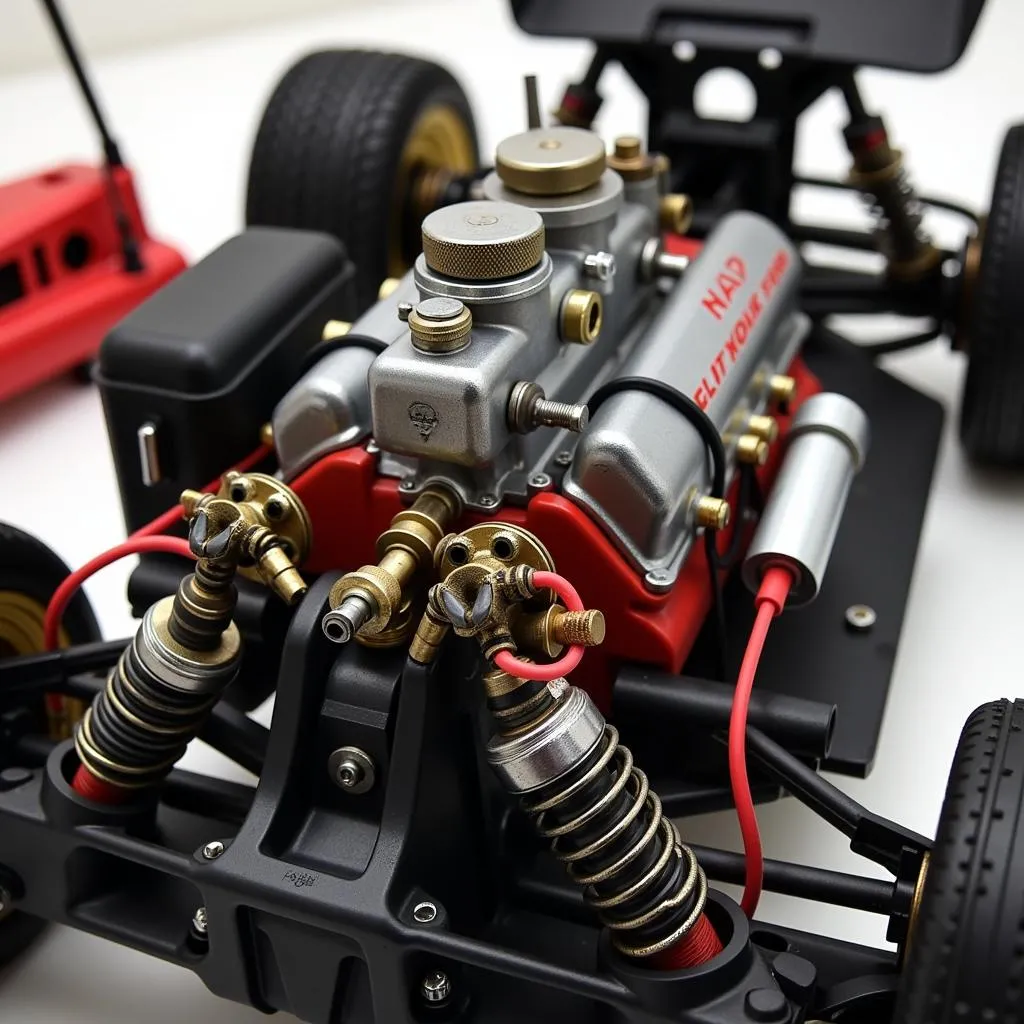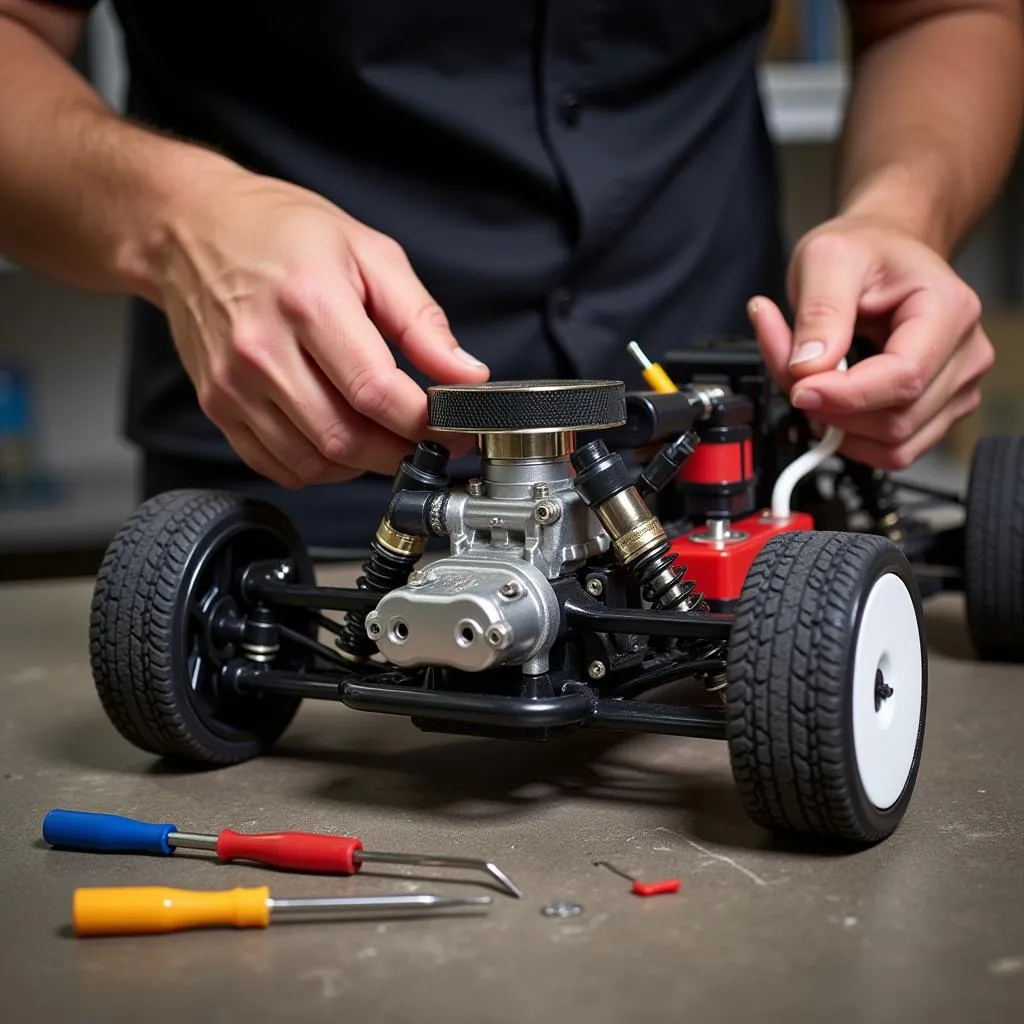Gas-powered RC cars offer a unique blend of power, speed, and realism that captivates enthusiasts of all ages. Unlike their electric counterparts, these miniature marvels run on a mixture of gasoline and oil, delivering an exhilarating experience that mimics full-sized vehicles.
 Nitro RC Car Engine Close Up
Nitro RC Car Engine Close Up
Understanding the Appeal of Gas RC Cars
What sets gas RC cars apart is their raw power and extended runtime. These cars are capable of reaching impressive speeds, often exceeding 50 mph, and their fuel tanks allow for longer periods of uninterrupted fun compared to electric RC cars with limited battery life.
Moreover, the sensory experience of a gas-powered engine, with its distinctive roar and exhaust fumes, adds a layer of authenticity that many hobbyists find irresistible. This visceral connection to the mechanics of the car enhances the overall enjoyment and provides a sense of accomplishment.
Types of Gas RC Cars
The world of gas RC cars offers a diverse range of options to suit different interests and skill levels:
- On-Road RC Cars: Designed for speed and performance on smooth surfaces, these cars excel in racing and high-speed maneuvering.
- Off-Road RC Cars: Built for rugged terrain, these vehicles feature durable construction, aggressive tires, and powerful engines to conquer obstacles and challenging landscapes.
- Trucks and Monster Trucks: These behemoths prioritize power and size, often equipped with massive tires and suspension systems designed for extreme off-road adventures.
Choosing the Right Gas RC Car
Selecting the perfect gas RC car depends on several factors:
- Experience Level: Beginners might prefer ready-to-run (RTR) models, while experienced hobbyists often opt for kits that require assembly and tuning.
- Intended Use: Consider the terrain and environment where you plan to drive the car.
- Budget: Gas RC cars vary in price, with more advanced models featuring higher-quality components and features.
Maintaining Your Gas RC Car
To ensure optimal performance and longevity, gas RC cars require regular maintenance:
- Fuel Mixing: Properly mixing gasoline with 2-stroke oil according to the manufacturer’s instructions is crucial for engine health.
- Air Filter Cleaning: A clean air filter ensures proper airflow to the engine, preventing performance issues.
- Spark Plug Inspection: Regularly checking and replacing the spark plug ensures reliable ignition.
 Mechanic Tuning Gas RC Car Engine
Mechanic Tuning Gas RC Car Engine
The Future of Gas RC Cars
While electric RC cars gain popularity, gas-powered models remain a mainstay in the hobby. The thrill of a roaring engine and the tangible connection to the mechanics continue to attract enthusiasts.
Manufacturers are constantly innovating, introducing new technologies and designs to enhance performance, durability, and user experience. The future of gas RC cars remains bright, fueled by passion and a desire for adrenaline-pumping action.
FAQs about Gas RC Cars
1. Are gas RC cars difficult to maintain?
With proper care and attention, maintaining a gas RC car is manageable. Regular cleaning, fuel mixing, and basic checks ensure smooth operation.
2. How fast can gas RC cars go?
Gas RC cars can reach impressive speeds, often exceeding 50 mph, depending on the model and engine.
3. Where can I find parts for my gas RC car?
Numerous online retailers and hobby shops specialize in gas RC car parts and accessories.
4. Can I use regular gasoline in my gas RC car?
No, using regular gasoline can damage the engine. Always use gasoline specifically formulated for 2-stroke engines and mix it with the appropriate oil.
5. Are gas RC cars suitable for children?
Gas RC cars are generally recommended for older children and adults due to their speed, power, and the need for responsible handling.
Need More Help?
If you have any further questions or need assistance with gas rc cars, feel free to reach out to our expert team. We are available 24/7 via WhatsApp: +1(641)206-8880, Email: [email protected] or visit us at 276 Reock St, City of Orange, NJ 07050, United States.


